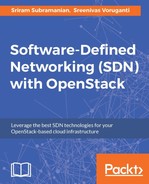Besides routing and firewall, OpenStack supports a few other commonly used networking technologies. Let's take a quick look at these without delving too deep into the respective commands.
Virtual machine instances created in OpenStack are used to run applications. Most applications are required to support redundancy and concurrent access. For example, a web server may be accessed by a large number of users at the same time. One of the common strategies to handle scale and redundancy is to implement load balancing for incoming requests. In this approach, a load balancer distributes an incoming service request onto a pool of servers, which processes the request, thus providing higher throughput. If one of the servers in the pool fails, the load balancer removes it from the pool and the subsequent service requests are distributed among the remaining servers. Users of the application use the IP address of the load balancer to access the application and are unaware of the pool of servers.
OpenStack implements load balancing using HAproxy software and a Linux namespace.
As mentioned previously, tenant isolation requires data traffic to be segregated and secured within an OpenStack cloud. However, there are times when external entities need to be part of the same network without removing the firewall-based security. This can be accomplished using a Virtual Private Network (VPN).
A VPN connects two endpoints on different networks over a public Internet connection, such that the endpoints appear to be directly connected to each other. VPNs also provide confidentiality and integrity of transmitted data.
Neutron provides a service plugin that enables OpenStack users to connect two networks using a VPN. The reference implementation of the VPN plugin in Neutron uses Openswan to create an IPSec-based VPN. IPSec is a suite of protocols that provides a secure connection between two endpoints by encrypting each IP packet transferred between them.
